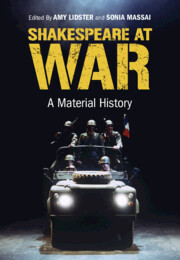Book contents
- Shakespeare at War
- Shakespeare at War
- Copyright page
- Contents
- Figures
- Notes on Contributors
- Acknowledgements
- Note on the Text
- Introduction
- Chapter 1 ‘The Truth for Which We Are Fighting’
- Chapter 2 The Seven Years’ War (1756–1763) and Garrick’s Shakespearean Nationalism
- Chapter 3 Revolutionary Shakespeare
- Chapter 4 Hamlet Mobilized
- Chapter 5 Shakespeare, the North-West Passage, and the Russian War
- Chapter 6 ‘Now for Our Irish Wars’
- Chapter 7 Shakespeare and the Survival of Middle England
- Chapter 8 Ellen Terry Stars at the Shakespeare Hut
- Chapter 9 The 1916 Shakespeare Tercentenary at № 1 Camp in Calais
- Chapter 10 Shakespeare Does His Bit for the War Effort
- Chapter 11 Germanizing Shakespeare during the First World War
- Chapter 12 Readers and Rebels
- Chapter 13 Forgotten Histories
- Chapter 14 ‘Now Good or Bad, ’tis but the Chance of War’
- Chapter 15 ‘Precurse of Feared Events’
- Chapter 16 But What Are We Fighting For?
- Chapter 17 Henry V and the Battle of Powerscourt
- Chapter 18 Unser Shakespeare in Nazi Germany
- Chapter 19 Framing the Jew
- Chapter 20 G. Wilson Knight’s ‘Royal Propaganda’ in ‘This Sceptred Isle’ (1941)
- Chapter 21 Shakespeare’s Desert Camouflage
- Chapter 22 ‘May I with Right and Conscience Make This Claim?’
- Chapter 23 Henry V and the Invasion of Iraq
- Chapter 24 Who Pays the Price?
- Chapter 25 ‘Mere Prattle, without Practice, Is All His Soldiership’
- Chapter 26 ‘Thou Hast Set Me on the Rack’
- Afterword
- Notes
- Index
Chapter 1 - ‘The Truth for Which We Are Fighting’
David Garrick’s The Tempest (1756) and Inclusive Britishness during the Seven Years’ War
Published online by Cambridge University Press: 17 August 2023
- Shakespeare at War
- Shakespeare at War
- Copyright page
- Contents
- Figures
- Notes on Contributors
- Acknowledgements
- Note on the Text
- Introduction
- Chapter 1 ‘The Truth for Which We Are Fighting’
- Chapter 2 The Seven Years’ War (1756–1763) and Garrick’s Shakespearean Nationalism
- Chapter 3 Revolutionary Shakespeare
- Chapter 4 Hamlet Mobilized
- Chapter 5 Shakespeare, the North-West Passage, and the Russian War
- Chapter 6 ‘Now for Our Irish Wars’
- Chapter 7 Shakespeare and the Survival of Middle England
- Chapter 8 Ellen Terry Stars at the Shakespeare Hut
- Chapter 9 The 1916 Shakespeare Tercentenary at № 1 Camp in Calais
- Chapter 10 Shakespeare Does His Bit for the War Effort
- Chapter 11 Germanizing Shakespeare during the First World War
- Chapter 12 Readers and Rebels
- Chapter 13 Forgotten Histories
- Chapter 14 ‘Now Good or Bad, ’tis but the Chance of War’
- Chapter 15 ‘Precurse of Feared Events’
- Chapter 16 But What Are We Fighting For?
- Chapter 17 Henry V and the Battle of Powerscourt
- Chapter 18 Unser Shakespeare in Nazi Germany
- Chapter 19 Framing the Jew
- Chapter 20 G. Wilson Knight’s ‘Royal Propaganda’ in ‘This Sceptred Isle’ (1941)
- Chapter 21 Shakespeare’s Desert Camouflage
- Chapter 22 ‘May I with Right and Conscience Make This Claim?’
- Chapter 23 Henry V and the Invasion of Iraq
- Chapter 24 Who Pays the Price?
- Chapter 25 ‘Mere Prattle, without Practice, Is All His Soldiership’
- Chapter 26 ‘Thou Hast Set Me on the Rack’
- Afterword
- Notes
- Index
Summary
This essay establishes a link between Garrick’s operatic adaptation of The Tempest, which opened at Drury Lane on 11 February 1756, and the imminent escalation of the French and Indian War (1754–63) into the Seven Years’ War (1756–63). In this essay, Massai argues that Garrick’s Tempest, generally dismissed as a flop and as an embarrassing misjudgement on his part, takes on greater topical significance and political resonance if reconsidered alongside the ‘Dialogue’ that Garrick wrote to be performed as prologue to the opera. By means of a close analysis of both texts, alongside Dryden and Davenant’s earlier adaptation of The Tempest (1667), Massai shows how Garrick’s opera and ‘Dialogue’ are in fact representative of wartime uses of Shakespeare, which, as this collection shows, often served as an important platform for the fashioning of current attitudes towards military conflict.
- Type
- Chapter
- Information
- Shakespeare at WarA Material History, pp. 7 - 16Publisher: Cambridge University PressPrint publication year: 2023

